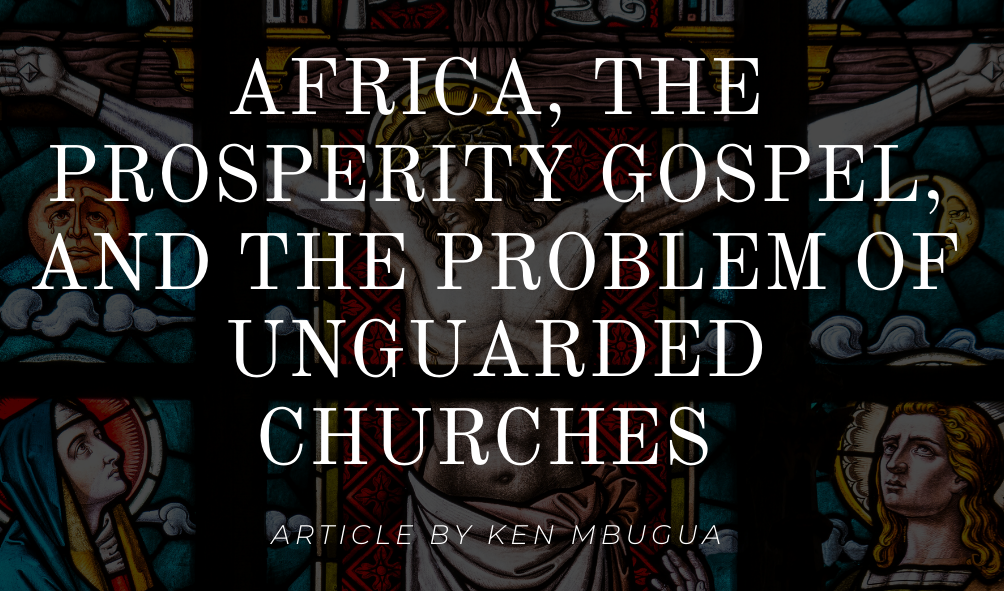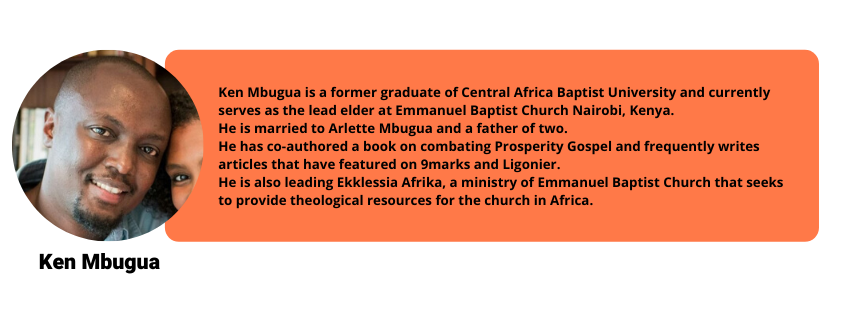
There can be no denying that distortions of the gospel have crept into many churches throughout Africa, chief amongst them being the prosperity gospel. But before effectively dealing with the issue of the prosperity gospel, we must ask why so many in African churches allowed this false gospel to slip in unchallenged. Where were the gate-keepers, the whistle blowers? And even now, why is there such deafening silence from so many of the now-indigenized African churches? The problem of the prosperity gospel today, as much as anything, roots in an ecclesiological problem from yesterday. Generally speaking, it appears as though the gospel efforts of years past in Africa did not come with any mechanisms by which professing Christians could protect and preserve the gospel from these constant threats of distortion. For instance, little attention has been given to carefully understanding the doctrine of conversion and what it means for meaningful church membership or church discipline. Likewise, missionaries and pastors have not asked what the gospel has to do with church government, the responsibility of every member for guarding against false teachers, or the need for a plurality of elders. Instead, the gospel is taken for granted and the African church suffers. It remains in desperate need of missionaries and churches who both understand the problems and are equipped with better and more biblical solutions.
Where are All the Christians?
Missionaries who labor in reached parts of Africa are today faced with a society that has been inoculated against the gospel. Cities are filled with people who have been baptized and acknowledged as members of churches from one denomination or another, thus affirming their status as Christians, even though many live lives that show no fruit of the Spirit’s work or evidence of a life of repentance and faith in Christ. For example, 80 percent of my fellow Kenyans would identify themselves as Christians, yet many go to church irregularly, if at all. They do not need the gospel and church, or so they think, because they are already “Christians.” Others who might frequent church more than this former group attend churches where the gospel is not articulated clearly. Though they are fervent in their religion, a great part of this group would struggle to articulate the gospel even in its most basic form. True gospel ministries established decades ago have in many cases grown into theologically weak churches that have given in to teaching variations of the prosperity gospel. It’s no wonder false gospels are wreaking havoc in Africa with little to no resistance. When churches are filled with those who do not know the gospel and are in many cases living lives unworthy of the gospel, then they cannot protect themselves from distortions in both gospel doctrine and gospel living, let alone raise an alarm among their community about the counterfeits that are masquerading as truth. We know God remains faithful, and he has indeed scattered his own in these places. It is our constant prayer and hope that he will raise up many more of that breed so that they one day would define the church landscape of Africa, that the prosperity gospel might die here. But today, the problem persists. So how can we do missions in a way that will protect the gospel for the present generation and for the generations to come?
Is Theological Education Enough?
A great deal of missionary effort is at present being focused on theological education. In many cases the pastors in the cities do not have any form of theological training. Generally speaking, previous missionary efforts did not place an emphasis on equipping the pastors who were left “in charge.” This absence of enduring discipleship has resulted in increasingly shallow theology, leaving many local churches susceptible to whatever error its society was infected with at present. As a response, theological institutions are being established across the continent. Conferences and seminars abound as we play catch-up after realizing that past missionary efforts, though helpful in bringing many to the Lord, proved unreliable in preserving the gospel for the next generation. This is a good work, and it is an urgent work. Yet despite the renewed efforts to train pastors, our continent still lacks enough qualified men to do the training as well as sufficient resources to finish the task.
A Blind Spot Remains
That said, a blind spot still plagues these commendable missionary efforts. Most efforts in church planting and pastoral training lack an emphasis on the local church. Systematic theology and other branches of Christian doctrine are greatly emphasized, as they should be, but ecclesiology remains unfortunately assumed and, as a result, misunderstood. This is a sad reality primarily because these assumed local churches are God’s primary plan for how the gospel will be displayed and preserved for the coming generations—not seminaries, not conferences, not theological training centers. In an ecclesiologically heavy letter to Timothy, Paul wrote, “I hope to come to you soon, but I am writing these things to you so that, if I delay, you may know how one ought to behave in the household of God, which is the church of the living God, a pillar and buttress of the truth” (1 Tim 3:14–15). How a church conducts its life together has everything to do with how they preserve the truth. The present generation in Africa would have been served well by churches that had been just as willing to excommunicate them as they were to baptize them. Having a city filled with people who claim to be followers of Christ but are living lives unworthy of the gospel distorts the truth of the gospel for both this generation and the next. God does not desire to preserve truth through theologically accurate books. He wants lives that reflect that truth by living it out together in local churches.
We Need Faithful Churches
If we teach churches today that the buck stops with them and that they are not mere bystanders in the mission but gate-keepers of the gospel, then maybe they might fire the next pastor who starts preaching heresy. If we teach churches that conversion is more than saying a prayer and if we stopped asking people to walk down the aisle or raise their hands to receive Jesus, we might have smaller churches captivated by the awe-inspiring grace of God rather than the eloquent, misguided pastor in a shiny suit. We might have churches that will guard the gospel more fervently for the glory of their God. The plagues of the prosperity gospel and false converts are not at the heart of the problem for the African church. They are mere symptoms of a more fundamental problem. God wants the local church to be built up so that it can withstand different winds of error. It might be prosperity gospel today and Gnosticism tomorrow. Focusing more missionary efforts on building healthy churches will help protect the gospel for our generation and for the one yet to come.
